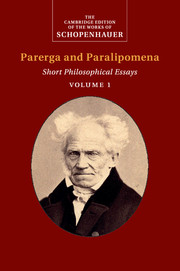Book contents
- Frontmatter
- Contents
- General Editor’s Preface
- Editorial Notes and References
- Introduction
- Notes on Text and Translation
- Chronology
- Bibliography
- Parerga and Paralipomena: Contents
- Preface
- Sketch of a History of the Doctrine of the Ideal and the Real
- Fragments for the History of Philosophy
- On University Philosophy
- Transcendent Speculation on the Apparent Deliberateness in the Fate of the Individual
- Essay on Spirit-Seeing and Related Issues
- Aphorisms on the Wisdom of Life
- Chapter I Fundamental Division
- Chapter II What One Is
- Chapter III What One Has
- Chapter IV What One Represents
- Chapter V Counsels and Maxims
- Chapter VI On the Different Stages of Life
- Versions of Schopenhauer’s Text
- Glossary of Names
- Index
Chapter VI - On the Different Stages of Life
Published online by Cambridge University Press: 30 June 2022
- Frontmatter
- Contents
- General Editor’s Preface
- Editorial Notes and References
- Introduction
- Notes on Text and Translation
- Chronology
- Bibliography
- Parerga and Paralipomena: Contents
- Preface
- Sketch of a History of the Doctrine of the Ideal and the Real
- Fragments for the History of Philosophy
- On University Philosophy
- Transcendent Speculation on the Apparent Deliberateness in the Fate of the Individual
- Essay on Spirit-Seeing and Related Issues
- Aphorisms on the Wisdom of Life
- Chapter I Fundamental Division
- Chapter II What One Is
- Chapter III What One Has
- Chapter IV What One Represents
- Chapter V Counsels and Maxims
- Chapter VI On the Different Stages of Life
- Versions of Schopenhauer’s Text
- Glossary of Names
- Index
Summary
Voltaire has made thefine remark:
Who has not the spirit of his age
Has all the misfortune of his age.
Therefore, it is appropriate that, at the end of theseeudaemonological observations, we take a look at thechanges produced in us by the different stages oflife.
Throughout our entire life we are always aware only ofthe present, nevermore. What differentiates it is the fact that in thebeginning we have a long future before us, buttowards the end we see a long past behind us. Alsoour temperament, though not our character, undergoessome well-known changes, so that each time thepresent acquires a different hue. –
In my chief work, vol. 2, ch. 31, pp. 394ff., I haveexplained that and why in our childhood we behave much more as cognitive than as willing beings. This isexactly what the blissfulness of the first quarterof our life is based upon, as a result of whichafterwards this period lies behind us like a lostparadise. In childhood we have only fewrelationships and small needs, hence littlestimulation of the will; therefore, the greater partof our essence is taken up by cognition. – The intellect, like thebrain, which reaches its full size already in theseventh year, develops early, although it does notmature early, and incessantly seeks nourishment in awhole world of the existence that is still fresh,where absolutely everything is coloured with thecharm of novelty. As a result, the years of ourchildhood are perpetual poetry. For the essence ofpoetry, like all art, consists in conceiving thePlatonic Idea, i.e. what is essential in everyparticular and hence common to its kind, so that each thingshows up as a representative of its genus andone case stands fora thousand. Although it seems that in the scenes ofour childhood we are always merely occupied with therespective individual object or event, and onlyinsofar as it interests our present willing, this isreally not the case.
- Type
- Chapter
- Information
- Schopenhauer: Parerga and ParalipomenaShort Philosophical Essays, pp. 419 - 436Publisher: Cambridge University PressPrint publication year: 2014

